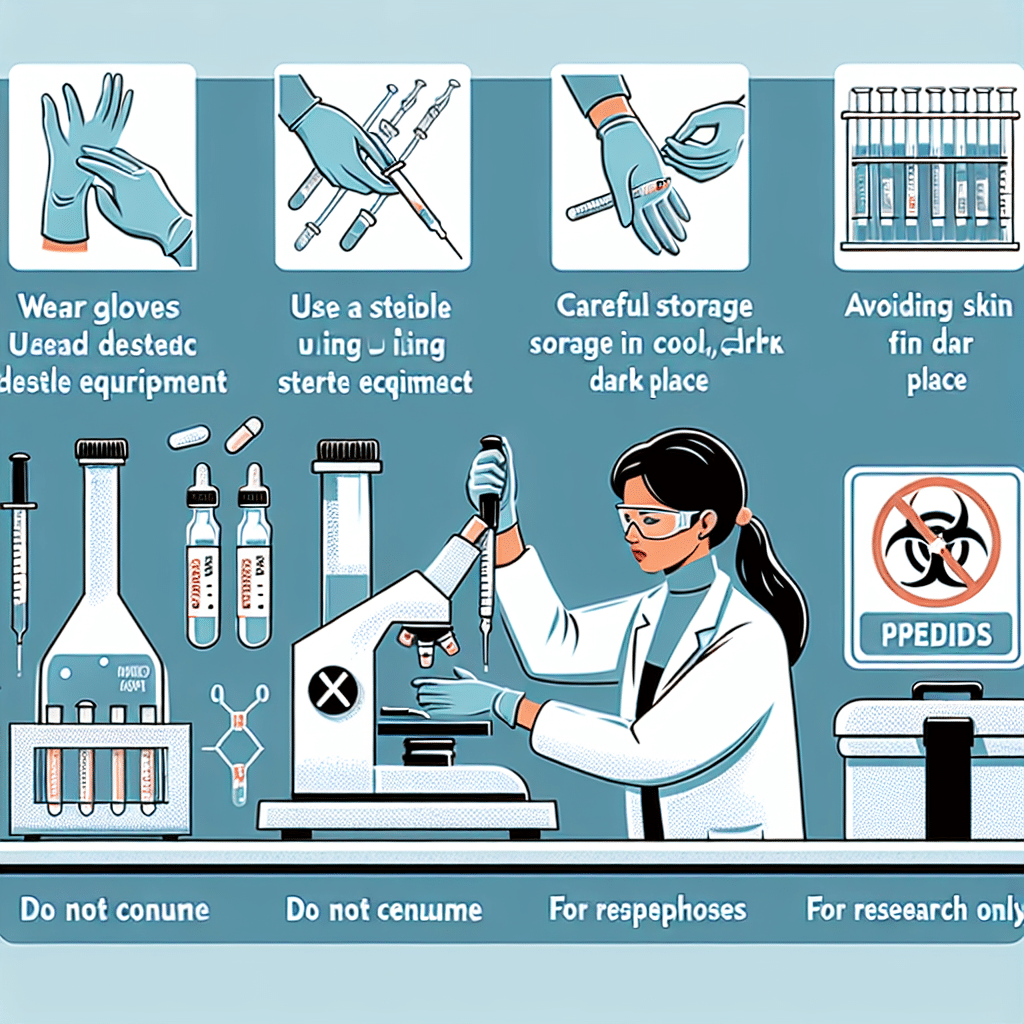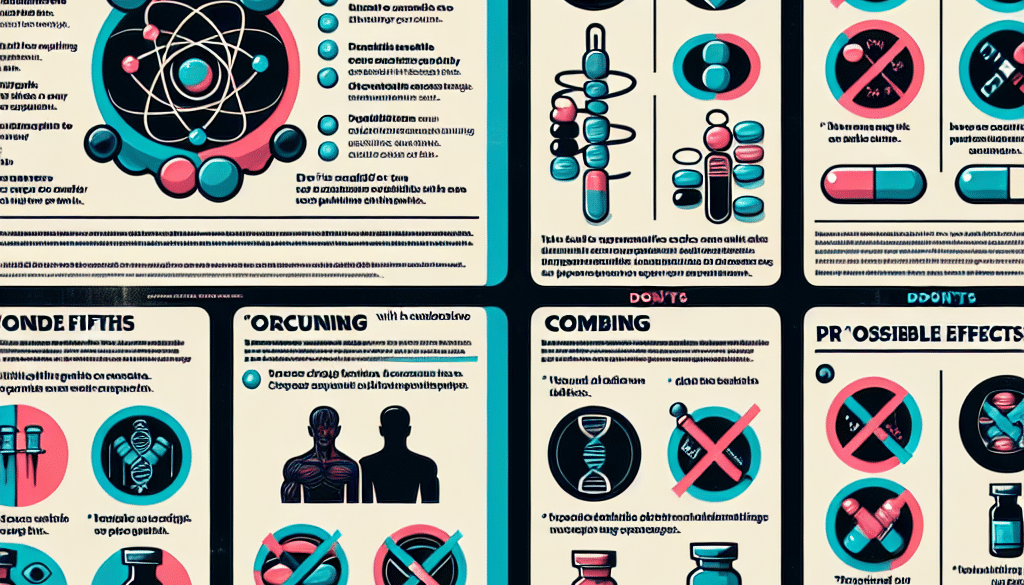What To Avoid When Using Peptides?
-
Table of Contents
- Peptides Usage: Key Precautions and What to Avoid
- Understanding Peptides and Their Uses
- Common Mistakes to Avoid When Using Peptides
- 1. Ignoring Quality and Purity
- 2. Improper Storage and Handling
- 3. Inadequate Research and Consultation
- 4. Overlooking Dosage and Administration Guidelines
- 5. Neglecting Potential Side Effects and Interactions
- Case Studies and Examples of Peptide Misuse
- Regulatory Considerations and Legal Implications
- Best Practices for Safe Peptide Use
- Conclusion: Navigating Peptide Use with Caution
- Discover ETprotein’s High-Quality Protein Products
Peptides Usage: Key Precautions and What to Avoid

Peptides have garnered significant attention in the fields of health, wellness, and beauty for their potential benefits, which range from enhancing athletic performance to promoting skin rejuvenation. However, as with any bioactive compound, there are important considerations and potential pitfalls to be aware of when using peptides. This article will delve into the critical aspects of what to avoid when incorporating peptides into your regimen, ensuring you can harness their benefits while minimizing risks.
Understanding Peptides and Their Uses
Before we explore what to avoid, it’s essential to understand what peptides are. Peptides are short chains of amino acids, the building blocks of proteins. They play various roles in the body, acting as hormones, neurotransmitters, and growth factors, among others. Synthetic peptides, which are designed to mimic natural peptides, are used for research and therapeutic purposes.
Common Mistakes to Avoid When Using Peptides
When using peptides, there are several common mistakes that individuals should be aware of to ensure safety and efficacy. Here are some key points to consider:
1. Ignoring Quality and Purity
- Always source peptides from reputable suppliers to ensure they are pure, correctly synthesized, and free from contaminants.
- Check for third-party testing and certifications that verify the quality of the peptides you intend to use.
2. Improper Storage and Handling
- Peptides can be sensitive to light, temperature, and moisture. Store them according to the manufacturer’s instructions to maintain their integrity.
- Handle peptides with care, using appropriate equipment and techniques to avoid degradation or contamination.
3. Inadequate Research and Consultation
- Before using peptides, thoroughly research their effects, potential side effects, and interactions with other substances.
- Consult with a healthcare professional, especially if you have pre-existing health conditions or are taking other medications.
4. Overlooking Dosage and Administration Guidelines
- Adhere to recommended dosages and administration guidelines to prevent adverse effects and achieve the desired outcomes.
- Do not self-prescribe or adjust dosages without professional guidance.
5. Neglecting Potential Side Effects and Interactions
- Be aware of potential side effects and monitor your body’s response to peptide use.
- Understand that peptides can interact with other drugs or supplements, potentially leading to harmful effects.
Case Studies and Examples of Peptide Misuse
There have been instances where the misuse of peptides has led to adverse outcomes. For example, athletes seeking performance enhancement have experienced health issues due to improper peptide use. Additionally, individuals using peptides for anti-aging purposes without proper guidance have reported side effects such as skin irritation or hormonal imbalances.
Regulatory Considerations and Legal Implications
It’s crucial to be aware of the legal status of peptides in your region. In some countries, certain peptides are classified as controlled substances and require a prescription. Using or distributing these peptides without proper authorization can have legal consequences.
Best Practices for Safe Peptide Use
To safely incorporate peptides into your routine, follow these best practices:
- Source peptides from reputable suppliers with a track record of quality and safety.
- Consult with healthcare professionals to determine if peptides are appropriate for your needs.
- Follow dosage and administration guidelines meticulously.
- Stay informed about the latest research and regulatory updates regarding peptide use.
Conclusion: Navigating Peptide Use with Caution
In conclusion, while peptides offer promising benefits, it is imperative to approach their use with caution. Avoiding common pitfalls such as neglecting quality, improper storage, inadequate research, overlooking dosage guidelines, and ignoring potential side effects is crucial for safe and effective peptide use. By adhering to best practices and consulting with professionals, individuals can minimize risks and make informed decisions about incorporating peptides into their health and wellness routines.
Discover ETprotein’s High-Quality Protein Products
If you’re looking for top-tier protein products, including peptides, consider ETprotein’s offerings. Their extensive range of organic bulk vegan proteins and L-(+)-Ergothioneine (EGT) products meet the highest standards of purity and quality. Whether you’re involved in the nutraceutical, pharmaceutical, cosmeceutical, or food and beverage industries, ETprotein can provide the protein solutions you need. Contact them today to learn more about their products and how they can support your peptide and protein requirements.
About ETprotein:
ETprotein, a reputable protein and L-(+)-Ergothioneine (EGT) Chinese factory manufacturer and supplier, is renowned for producing, stocking, exporting, and delivering the highest quality organic bulk vegan proteins and L-(+)-Ergothioneine. They include Organic rice protein, clear rice protein, pea protein, clear pea protein, watermelon seed protein, pumpkin seed protein, sunflower seed protein, mung bean protein, peanut protein, and L-(+)-Ergothioneine EGT Pharmaceutical grade, L-(+)-Ergothioneine EGT food grade, L-(+)-Ergothioneine EGT cosmetic grade, L-(+)-Ergothioneine EGT reference grade and L-(+)-Ergothioneine EGT standard. Their offerings, characterized by a neutral taste, non-GMO, allergen-free attributes, with L-(+)-Ergothioneine purity over 98%, 99%, cater to a diverse range of industries. They serve nutraceutical, pharmaceutical, cosmeceutical, veterinary, as well as food and beverage finished product distributors, traders, and manufacturers across Europe, USA, Canada, Australia, Thailand, Japan, Korea, Brazil, and Chile, among others.
ETprotein specialization includes exporting and delivering tailor-made protein powder and finished nutritional supplements. Their extensive product range covers sectors like Food and Beverage, Sports Nutrition, Weight Management, Dietary Supplements, Health and Wellness Products, and Infant Formula, ensuring comprehensive solutions to meet all your protein needs.
As a trusted company by leading global food and beverage brands and Fortune 500 companies, ETprotein reinforces China’s reputation in the global arena. For more information or to sample their products, please contact them and email sales(at)ETprotein.com today.












